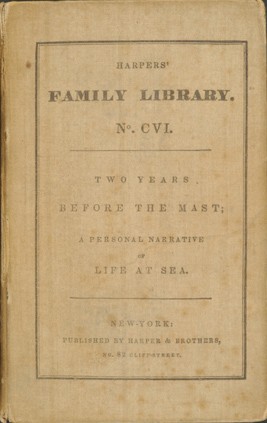For the first of two epigraphs to the chapter on White-Jacket in The New Cambridge Companion to Herman Melville, Jeannine Marie DeLombard chooses a vivid passage on flogging from Dana's Two Years Before the Mast featuring two exclamatory uses of the N-word, the second in all capital letters.
In parentheses, DeLombard gives the date as 1840, thus presenting the doubly loaded epigraph as a quotation from the first edition of Two Years Before the Mast.
This date is important for historically grounding the ensuing argument, as DeLombard makes sure to point out early on, at the start of the second paragraph:
But that first epigraph from Dana's book rather exemplifies the rhetoric of postbellum culture. At any rate, the Dana epigraph is not taken from any publication in 1840 or any year before the Civil War. It really comes from 1869 and after. Dana's 1840 edition reads as follows:
Now perhaps Dana in 1869 was aiming to restore the sadistic captain's offensive language as he originally heard it, not as first printed in 1840. OK but even so, you would need to explain that line of reasoning. You can't give 1840 as the publication date of a text first published in 1869. Well you can, it turns out, but you shouldn't. For comparison, Hathi Trust digital library also has the 1869 revised edition with the passage that DeLombard excerpts for her epigraph.
You could say the vocabulary does not matter a bit for DeLombard's argument, that either way, in either version, Dana's sailors are explicitly compared to and treated as slaves. Yes indeed! So why bother at all with the anachronistic (in a discussion focused on Melville's 1850 White-Jacket and antebellum culture) and for us in our time gratuitously offensive 1869 version?
The crazy thing is, on page 284 of her book In the Shadow of the Gallows (University of Pennsylvania Press, 2012), DeLombard did accurately quote the 1840 passage from the 1981 Penguin edition (where editor Thomas Philbrick followed "the text of the original Harper edition"). And as in the New Cambridge Companion, DeLombard juxtaposed Dana with Ishmael.
https://books.google.com/books?id=zEH8Rjmwi-EC&pg=PA284&dq#v=onepage&q&f=false
What's going on?
This date is important for historically grounding the ensuing argument, as DeLombard makes sure to point out early on, at the start of the second paragraph:
"My epigraphs indicate antislavery rhetoric's pervasive influence on antebellum culture." --"White-Jacket: Telling Who Is--and Aint--a Slave" in The New Cambridge Companion to Herman Melville, ed. Robert S. Levine (Cambridge University Press, 2014) page 51.Maybe so for the second epigraph from Moby-Dick, although a case can be made for Seneca as the inspiration for Melville's philosophical question "Who aint a slave?"
"He is a slave." His soul, however, may be that of a freeman. "He is a slave." But shall that stand in his way? Show me a man who is not a slave; one is a slave to lust, another to greed, another to ambition, and all men are slaves to fear. I will name you an ex-consul who is slave to an old hag, a millionaire who is slave to a serving-maid; I will show you youths of the noblest birth in serfdom to pantomime players! No servitude is more disgraceful than that which is self-imposed. --Seneca, EPISTLE XLVII
 |
| Plato, Seneca, and Aristotle via Wikimedia Commons |
"You see your condition! You see where I've got you all, and you know what to expect!"—"You've been mistaken in me—you didn't know what I was! Now you know what I am!"—"I'll make you toe the mark, every soul of you, or I'll flog you all, fore and aft, from the boy, up!"—"You've got a driver over you! Yes, a slave-driver—a negro-driver! I'll see who'll tell me he is n't a negro slave!" --1840 Two years before the mastThis same passage with "negro-diver" and "negro" instead of the capitalized N-word was quoted in the October 1840 review in the New York Knickerbocker.
Now perhaps Dana in 1869 was aiming to restore the sadistic captain's offensive language as he originally heard it, not as first printed in 1840. OK but even so, you would need to explain that line of reasoning. You can't give 1840 as the publication date of a text first published in 1869. Well you can, it turns out, but you shouldn't. For comparison, Hathi Trust digital library also has the 1869 revised edition with the passage that DeLombard excerpts for her epigraph.
You could say the vocabulary does not matter a bit for DeLombard's argument, that either way, in either version, Dana's sailors are explicitly compared to and treated as slaves. Yes indeed! So why bother at all with the anachronistic (in a discussion focused on Melville's 1850 White-Jacket and antebellum culture) and for us in our time gratuitously offensive 1869 version?
The crazy thing is, on page 284 of her book In the Shadow of the Gallows (University of Pennsylvania Press, 2012), DeLombard did accurately quote the 1840 passage from the 1981 Penguin edition (where editor Thomas Philbrick followed "the text of the original Harper edition"). And as in the New Cambridge Companion, DeLombard juxtaposed Dana with Ishmael.
https://books.google.com/books?id=zEH8Rjmwi-EC&pg=PA284&dq#v=onepage&q&f=false
What's going on?


No comments:
Post a Comment